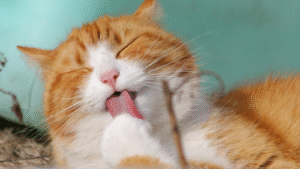It was -29F wind chill. Late at night. We had the heat cranked up in the house. My chocolate lab Dakota struggles with urinary incontinence and has to go outdoors frequently. There she stood by the door to go outside for her usual “before bed potty break”, and as I opened the door I felt the numbing cold jolt through my own body. Dakota, who normally has to be coaxed to come back from the yard ran quickly out to do her business and was immediately back at the door to come in.
I stood there and waited on her return, fearful that if I walked away in my half asleep daze that she would be forgotten for a few minutes. And while standing there, I thought about if I should do more for her to protect her from the subzero temperatures. Boots? A sweater?
In Upstate New York, we still have many more months to be concerned about arctic like temperatures and we need to ensure that we are still taking appropriate precautions with our pets. It’s reasonable to assume that if you are cold, your pet is likely cold too. When the temperatures drop, it is always safer to keep your pets indoors as much as possible. Be sure to keep outdoor bathroom breaks short and to the point, even with thick coated dogs whose exposed areas such as noses and paw pads will still be susceptible to frost bite and injury.
If you take your dog on a walk outside, inspect their paws as they come in, and wipe them to clean any salt or chemicals from them. You can even purchase boots for your pets’ feet from many pet stores and farm stores. Short haired and younger pets may appreciate a cozy sweater as well.
Indoor/outdoor kitties should probably more “indoor” than “outdoor” this time of the year, and adequate outdoor shelters should be available for them. If you would like more information on providing shelter for outdoor cats during the winter months, the humane society website has some great information: https://www.humanesociety.org/resources/how-care-outdoor-cats-winter
Also, check the areas around your cars to make sure there is no oil or antifreeze leakage that is toxic to our pets. And since a warming car may appear to be a tempting shelter for outdoor animals, peak under your car for animals and honk the horn prior to departing.
Now is also an important time of the year to remember to get your pets in for their routine physical at your veterinarian. Certain illnesses may be exacerbated by the cold, such as arthritis in dogs; and asthma in cats (higher concentration of indoor allergens). You may find that your pet’s medications need to be adjusted over the winter months to accommodate for these changes.
So when Dakota returned from her midnight potty break, I was sure to inspect her paws and then usher on to her cushy bed in our warm bedroom, where she curled up next to her “sister” and fell sound asleep.
By Dr. Kim Cargill, DVM









